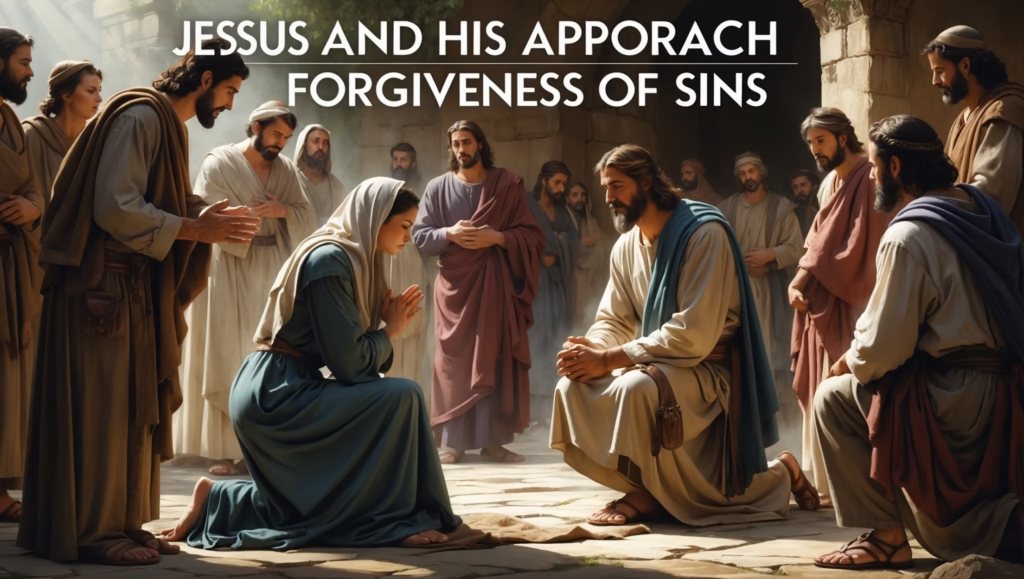Introduction
The life and ministry of Jesus Christ are centered on the profound message of grace, mercy, and redemption. One of the most striking aspects of His mission was His radical approach to the forgiveness of sins. In a society bound by strict legalism and religious traditions, Jesus offered something revolutionary—complete forgiveness, reconciliation with God, and the invitation to begin a new life. Unlike the prevailing belief that forgiveness could only be mediated through temple rituals, sacrifices, or priestly intercession, Jesus Himself extended pardon directly to individuals. This marked a new era in spiritual understanding, where mercy triumphed over judgment and grace extended beyond boundaries. His teaching on forgiveness revealed God’s heart for humanity, showing that no sin was too great to be pardoned, and no sinner too far gone to be restored.

Encounters with Sinners
Throughout the Gospels, Jesus’ forgiveness of sins is demonstrated vividly through His encounters with sinners. These encounters were not only transformative for the individuals involved but also served as public demonstrations of God’s love and power to redeem.
One of the most well-known episodes is the account of the woman caught in adultery (John 8:1–11). According to the law, she was subject to stoning, a punishment that symbolized the severity of sin and the pursuit of justice. Yet, when she was brought before Jesus, He responded with both wisdom and mercy. Instead of condemning her, He challenged her accusers by declaring, “Let the one who is without sin cast the first stone.” One by one, the accusers departed, leaving Jesus alone with the woman. His words, “Neither do I condemn you. Go and sin no more,” encapsulated the heart of His mission: forgiveness accompanied by a call to transformation.
Another significant example is found in Luke 7:36–50, where a sinful woman anoints Jesus’ feet with her tears and costly perfume. While the Pharisees judged her harshly, Jesus recognized her deep repentance and faith. He declared, “Your sins are forgiven,” demonstrating that forgiveness was not limited by societal stigma or religious boundaries but was granted through faith and repentance. This encounter emphasized the personal and intimate nature of Jesus’ forgiveness, as He looked beyond outward labels and saw the heart’s sincerity.
Similarly, the story of the paralytic in Mark 2:1–12 highlights Jesus’ authority to forgive sins. When the man was lowered through the roof by his friends, Jesus first declared his sins forgiven before healing him physically. This act shocked the religious leaders, who believed only God could forgive sins. Yet, through this miracle, Jesus revealed His divine authority, proving that forgiveness was inseparable from His identity as the Son of God.
Teaching on Repentance
Forgiveness, according to Jesus, was not an isolated act but deeply tied to repentance and faith. His teachings consistently emphasized that acknowledgment of sin and a genuine turning away from it were essential for receiving God’s grace. Repentance was not merely sorrow over wrongdoing but a conscious decision to realign one’s life with God’s will.
In His parables, Jesus reinforced this principle. The Parable of the Prodigal Son (Luke 15:11–32) powerfully illustrates the connection between repentance and forgiveness. The wayward son squandered his inheritance in reckless living, only to find himself destitute. Upon returning home with a repentant heart, he was embraced by his father, who restored him fully without hesitation. The father’s response reflects God’s readiness to forgive all who turn back to Him, no matter how far they have strayed. This parable not only underscores God’s mercy but also highlights the joy that accompanies repentance and restoration.
Jesus also linked forgiveness with the necessity of extending it to others. In the Lord’s Prayer (Matthew 6:9–13), He taught His disciples to pray, “Forgive us our sins, as we forgive those who sin against us.” This teaching establishes forgiveness as a two-way relationship: receiving it from God and offering it to others. In Matthew 18:21–35, through the Parable of the Unforgiving Servant, Jesus warned that those who withhold forgiveness from others cannot expect to fully experience God’s mercy. Forgiveness, then, is not optional but integral to the Christian life.
Living in Forgiveness
Jesus’ approach to forgiveness of sins has profound implications for how believers are called to live today. To embrace forgiveness means to live in freedom, unshackled from guilt and condemnation. It also means extending that same grace to others, even when it is difficult.
Practical application begins with self-examination. Just as Jesus called people to acknowledge their sins and repent, modern believers must cultivate humility and honesty before God. Confession is not about dwelling on failure but about receiving God’s cleansing and restoration. The Apostle John echoes this truth in 1 John 1:9, affirming that “If we confess our sins, He is faithful and just to forgive us and to cleanse us from all unrighteousness.”
Living in forgiveness also requires an intentional choice to release bitterness and resentment toward others. This does not mean condoning wrongdoing but recognizing that forgiveness breaks the cycle of anger and allows healing to begin. In practical terms, forgiving others mirrors the mercy that Jesus demonstrated.
Moreover, forgiveness fosters reconciliation and strengthens communities. In a fractured world where conflict and division are common, practicing forgiveness reflects the kingdom values Jesus came to establish. It challenges believers to embody mercy and grace in their relationships, workplaces, and broader society.
Finally, forgiveness empowers transformation. Jesus’ encounters with sinners did not leave them unchanged; they were called to new lives of holiness and purpose. In the same way, living in forgiveness today means embracing transformation through the Holy Spirit. It is a continual process of growth, where past failures no longer define one’s identity, and God’s grace becomes the foundation for a renewed future.
Conclusion
Jesus’ approach to forgiveness of sins stands as one of the most liberating and transformative aspects of His ministry. Through His encounters with sinners, His teachings on repentance, and His call to forgive others, He revealed the boundless mercy of God and the pathway to redemption. Forgiveness was not about dismissing sin but about breaking its hold and offering a new beginning. His example continues to inspire believers to embrace grace, live in freedom, and extend mercy to others. By following His example, individuals and communities alike can experience healing, restoration, and the fullness of life that forgiveness brings.









